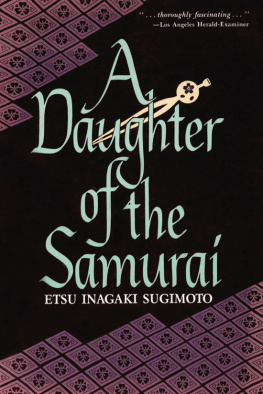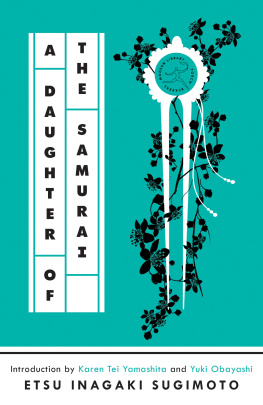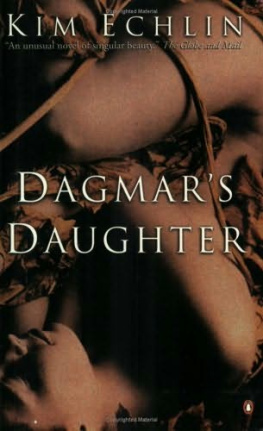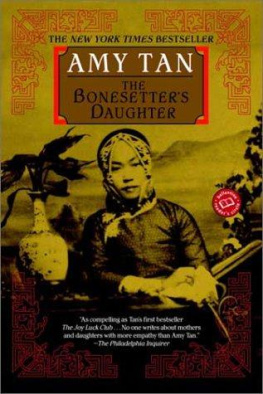Etsu Inagaki Sugimoto - Daughter of the Samuari
Here you can read online Etsu Inagaki Sugimoto - Daughter of the Samuari full text of the book (entire story) in english for free. Download pdf and epub, get meaning, cover and reviews about this ebook. year: 2012, publisher: Tuttle, genre: Non-fiction. Description of the work, (preface) as well as reviews are available. Best literature library LitArk.com created for fans of good reading and offers a wide selection of genres:
Romance novel
Science fiction
Adventure
Detective
Science
History
Home and family
Prose
Art
Politics
Computer
Non-fiction
Religion
Business
Children
Humor
Choose a favorite category and find really read worthwhile books. Enjoy immersion in the world of imagination, feel the emotions of the characters or learn something new for yourself, make an fascinating discovery.
- Book:Daughter of the Samuari
- Author:
- Publisher:Tuttle
- Genre:
- Year:2012
- Rating:3 / 5
- Favourites:Add to favourites
- Your mark:
- 60
- 1
- 2
- 3
- 4
- 5
Daughter of the Samuari: summary, description and annotation
We offer to read an annotation, description, summary or preface (depends on what the author of the book "Daughter of the Samuari" wrote himself). If you haven't found the necessary information about the book — write in the comments, we will try to find it.
Daughter of the Samuari — read online for free the complete book (whole text) full work
Below is the text of the book, divided by pages. System saving the place of the last page read, allows you to conveniently read the book "Daughter of the Samuari" online for free, without having to search again every time where you left off. Put a bookmark, and you can go to the page where you finished reading at any time.
Font size:
Interval:
Bookmark:

A DAUGHTER OF THE SAMURAI


Published by the Charles E. Tuttle Company, Inc.
of Rutland, Vermont & Tokyo, Japan
with editorial offices at
Osaki Shinagawa-ku, Tokyo 141-0032
1966 by Charles E. Tuttle Co., Inc.
All rights reserved
First Tuttle edition, 1966
First Tuttle paperback edition, 1990
Third printing, 1993
LCC Card No. 66-15849
ISBN: 978-1-4629-0367-2 (ebook)
Printed in Japan
WITH RESPECT AND LOVE AND DEEPEST GRATITUDE
I DEDICATE THESE SACRED MEMORIES
TO
MY TWO MOTHERS
WHOSE LIVES AND ENVIRONMENTS WERE FAR APART,
YET WHOSE HEARTS MET IN MINE
ACKNOWLEDGMENT
TO
NANCY VIRGINIA AUSTEN
Whose pleasant friendship, energetic spirit, and practical knowledge encouraged me to believe that a little Etsu-bo, with a heart full of love for old Japan, could gather the falling fragments of samurai spirit and weave them into a fragrant chain for the readers of to-day.
CONTENTS
| CHAPTER | PAGE |
| I. | i |
| II. | ii |
| III. | |
| IV. | |
| V. | |
| VI. | |
| VII. | |
| VIII. | |
| IX. | |
| X. | |
| XI. | |
| XII. | |
| XIII. | |
| XIV. | |
| XV. | |
| XVI. | |
| XVII. | |
| XVIII. | |
| XIX. | |
| XX. | |
| XXI. | |
| XXII. | |
| XXIII. | |
| XXIV. | |
| XXV. | |
| XXVI. | |
| XXVII. | |
| XXVIII. | |
| XXIX. | |
| XXX. | |
| XXXI. | |
| XXXII. |
ILLUSTRATIONS
| Madame Etsu Inagaki Sugimoto... | Frontispiece |
| FACING PAGE | |
PUBLISHER'S FOREWORD
T HE Japan of the samuraia land of tradition and set behaviorhas almost disappeared. It would be hard to find a culture whose values were further removed from those of the West. Etsu Sugimoto was in the unusual situation of being brought up in a samurai family, being rigidly schooled so that she would be an intelligent and capable wife, and then being sent to America to meet for the first time her future husband. Her life in the West enabled her to remember her childhood with nostalgia and yet with detachment.
Her childhood memories are, perhaps, the most moving part of her autobiography. Her adventures in the family home, her journey over the mountains to Tokyo on horseback and in jin-rikishas, her first taste of meat, when the family shrine had to be covered so the gods would not be offendedthese are magic memories which she recaptures perfectly; yet her account of America shows us Western life in a new light. Why, she wondered, were American women so irresponsible about money? In Japan it was their duty to see that their husband never had to think about such things. How odd to make social calls in the evening! That was the time of leisure at home. It was all very strange, and it was a long time before she could look at life in America and not be shocked.
How lucky that Madame Sugimoto did record her memories! Soon after the Meiji Restoration of 1868 introduced Western ideas into a still-feudal Japan, the samurai were fated to disappear. This, then, is a memoir of an almost-forgotten age, which seems far removed from the Japan of today.
Since it was first published in 1926, A Daughter of the Samurai has been reprinted many times. Letters of appreciation have been written to the author from people as diverse as Albert Einstein and Rabindranath Tagore. It is frequently referred to by Ruth Benedict in her Chrysanthemum and the Sword, for in this account of the traditional life of Japan are many pointers to the attitudes of present-day Japanese to their country and the world. Madame Sugimoto's autobiography shows us an apparently alien world from the inside, with which the Western reader finds himself deeply in sympathy.
THE PUBLISHERS
INTRODUCTION
T HERE are many happy adventures for those who work in the strange world of printers' ink; and in some lucky moment of inspiration, several years ago, I asked Mrs. Sugimoto to write, for my column in a Philadelphia newspaper, some little memories of her girlhood in Japan. The story of the dog Shiro, whose prosperity in a future life she endangered by giving him her own cushion; her childish sadness about her curly hair; her pensive trouble when she discovered that American women were not really more modest than Japanesethese and a few other charming episodes first found their way into print in that newspaper, and gradually led to this beautiful and thrilling book. It is an honour to be asked by Mrs. Sugimoto to say a word of introduction here. I only wish that I knew how to make it ceremonious enough. For the inner suggestion of her book is surely that life in its highest moments is a kind of ceremony in honour of the unknown gods. "The eyelids of a Samurai," Mrs. Sugimoto tells us, "know not moisture." But the "red barbarians," who have not learned the old stoic art, may be forgiven if they feel occasionally, among her tender paragraphs, that dangerous prickling that great truth conveys.
What a lovely book it is, and how much it has to teach us. I have a secret notion that it will go on for years and years, making friends for itself and for the brave woman who wrote it, and alsothis would please her mostfriends for Japan. Is it not a perfect book for children to read? I don't know any collection of fairy tales more entrancing. And for parents too: is it not the subtlest kind of treatise on education? For the pure art and humour and simplicity of the narrative: where is there a more charming short story than that of Mr. Toda? A great American writer, who was in many things as far as possible from the old Samurai codes (Walt Whitman), said, "As soon as histories are properly told there is no more need of romances." This book is a history properly told. Some of us may think that Mrs. Sugimoto has been even a little too generous toward the America she adopted. But she came among us as Conrad came among the English; and if the little Etsu-bo, the well-loved tomboy of snowy winters in Echigo, finds beauty in our strange and violent ways, we can only be grateful.
Among her delicate and significant anecdotes, each a gem of artistic thought and feeling, she tells of the Japanese fiancee whose betrothed had a plum-blossom as his family crest, and therefore the young woman must pay particular honour to that flower, and could not even eat plum jelly, which would be disrespectful to the emblem of. her future husband. In the same way I feel obscurely that I must not write too much about Mrs. Sugimoto: because I honour her greatly, to write fulsomely here would be disrespectful to her beautiful book. I can only say that this story of a Japanese girlhood and of the brave child who found a seed of liberty stirring in her heart seems to me one of those rare triumphs where two diverse worlds speak openly to one another and both are profited.
Font size:
Interval:
Bookmark:
Similar books «Daughter of the Samuari»
Look at similar books to Daughter of the Samuari. We have selected literature similar in name and meaning in the hope of providing readers with more options to find new, interesting, not yet read works.
Discussion, reviews of the book Daughter of the Samuari and just readers' own opinions. Leave your comments, write what you think about the work, its meaning or the main characters. Specify what exactly you liked and what you didn't like, and why you think so.











